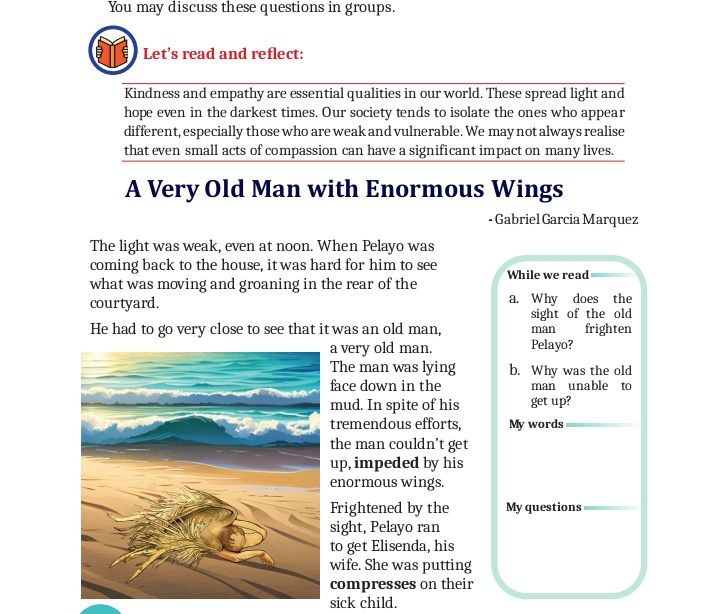DIDI
READ AND RESPOND
1. What was Shaheen's first impression of orphanage?
In the Orphanage shaheen saw crying children, laughing children,quiet children and screaming children. She was confused. She saw the inequity of life there.
2. Why does she say that life was not perfect during summer vacation?
She says that life was not perfect during summer vacation because her summers were spent between the orphanage in Jakarta and trips back to Mumbai. She saw the extreme poverty and children begging for food.
3. What was the 'search' shaheen had in her childhood? How was India answering it?
The 'search' she had in her childhood was finding ways to help the kids in need. India was answering it because in India she found many children begging on the streets for food. She knew she could help them to live better lives.
4. What do you understand by the expression "manicured reality of my university life"?
'Manicure' means caring for the fingers and nails. Manicured reality is polished reality. As one who has studied in India, especially in the crowded Mumbai, the author felt her university life in the USA was manicured, highly polished.
5. On what conditions did shaheen's parents allow her to stay back in India?
Shaheen parents putforward two conditions : she would get admission into a good undergraduate college in the city and later she would go abroad for her graduate degree.
6. How did Shaheen get her admisssion to St. Xavier's even when the admissions were closed?
Shaheen Mistri could understand that admissions were closed three months ago. So she forced Principal to admit her. She described to him about her plans and he admitted her to St. Xavier college.
7. What was the condition of Mumbai slums?
It was horrible. The slum once Shaheen walked into was a sprawling, low income community which was a maze of small alleyways. It was full of life. Some 10,000 people lived there without running water, no system of waste disposal and shared six dark cubicle toilets in one alley.
8. How was Sandya's life different from that of Shaheen?
Sandya's life was totally different from that of Shaheen. Like she was also eighteen. Sandhya knew no English and Shaheen knew no Hindi. But Sandhya, wearing a sari, smiled, laughed and chatted a lot. Sandhya's house was smaller than the bathroom of Shaheen's house.
9. What is the basic principle of Akanksha?
The basic principle of Akanksha is providing underprivileged children with oppertunities for learning. Akanksha wants the classroom to be just a safe place for the children where they can forget, atleast for some time, their troubles at home and study and also enjoy. Akanksha came into existence in 1991. It started with 15 children. Now it has 3500 children with 58 centres and 6 schools. The children are taught, apart from English and Maths, values, self-esteemand confidence.
10. What did the volunteers teach at Akanksha?
At Akanksha the volunteers teach the underprivileged children basic English and Maths, and also values, self esteemand confidence.
11. What kinds of difference, do you think, Akanksha must have brought in the slums?
Now the slum- dwellers know the importance of education. They also know the importance of hygiene and decent living. They have realized that they too can rise higher in the society with education., defermination and hardwork. Akanksha has provided people with hopes and dreams.
Think And Write
1. What kind of problems did Shaheen face when she settled in India?
She faced a lot of problems when she settled in India. She wanted to help the underprivileged people of slums, especially children. She wanted to teach them. But finding a place was difficult. She went to 20 schools asking them to give a room just for 3 hours in the morning to teach these poor children. All of them refused. Some thought the idea of teaching underprivileged children was too revolutionary. Some thought the children would spread diseases to other students. A principal of a reputed school even said that the glass bangles worn by the poor children would scratch the fine desks. Finally, when she was about to give up, the Principal of Holy Name High School in Colaba, agreed to give her a room. That was the first Akanksha centre.
2. What was the iniquity that she found in India?
She found a lot of iniquity in India. In a city like Mumbai where some of the world’s richest men live, there are also dirty slums where people live in conditions in which even animals would not live. One of the slums she visited was a sprawling, low income community which was a maze of small alleyways, full of life. Some .10,000 people lived there without running water, no system of waste disposal, and shared six dark cubicle toilets in one alley. She says the house of Sandhya was smaller than her bathroom! This is iniquity indeed.
3. Why, do you think, the principals of different schools refused to give a space for the children from the slum?
Shaheen says that the principals often gave illogical and even silly reasons for not giving a space for the children from the slum. Some thought the idea of teaching underprivileged children was too revolutionary. Some thought the children would spread diseases to other students. A principal of a reputed school even said that the glass bangles worn by the poor children would scratch the fine desks in the classroom!
4. Shaheen refers to Indian education system as ‘bookish’. Comment on this.
Shaheen is very right in saying that the Indian education system is bookish. We lay stress on book¬learning. We give a lot importance to studying things by heart. The examinations also check our memory and not our competence in doing things. Theory is given much more importance than practice. We may know a lot about America and England but may not know the things in our immediate locality.
Activity I (Job application/Resume)
Answer
Name
Address
16 January 2022
Ms.Shaheen Mistri
‘Teach For India’
Mumbai
Dear Sir,
With reference to your advertisement in The Hindu dated 23/07/2015, I would like to apply for the post of teaching faculty in your institution.
I have a passion for teaching. I am also interested in doing social service. Hence I
believe that it would be a pleasure for me to serve in your esteemed institution. As far my qualification, I have passed M.A. in English from Kerala University. I passed Post graduate Diploma in English Language Teaching from CIEFL, Hyderabad. Moreover, I have five years of experience in the same field. I have enclosed my resume for your further consideration.
Sir, I assure you, if selected, I will do my best to your entire satisfaction.
Sincerely
Name and signature
RESUME
Name
Address Ph No:
……………. E-mail ID:....
Objective : To nurture the talent and cognition of each student aiming at their
overall development and mould them as nice citizen
Education : 2007-2009 Post Graduate Diploma in English Language - Teaching - CIEFL- 80%
2005-2007 M.A. in English - Kerala University – 78%
2002-2005 B.A. in English - Kerala University - 82%
2000 - SSLC - Board of Public Exam, Kerala – 94%
Experience : 2012-2014 Govt ITI, Alappuzha- Spoken English Instructor
2010-2012 Institute of English, Trivandrum- Guest lecturer
2009-2010 MGM Public School, Trivandrum - TGT
Activities : Member- ELT Journal Committee
District Co-ordinator of ASAP
Achievements: Participated in the seminar on ‘Trends in Teaching a Foreign language’ at National Level
Selected the Best Orator at the district level
3rd rank holder in PG in Kerala University
Skills : good at ICT integrated ELT for the beginners, writing poems
Languages : English, Malayalam, Hindi and Tamil (can speak)
Interests : social service and reading novels
Activity II (Job Interview:)
Answer:
Interviewer : Why do you prefer to teach?
You : I preférto teach because I believe it is the noblest profession. You mould minds.
Interviewer : Do you have any teaching experience?
You : Yes, I have. I have been teaching since 1997, when I completed my M.A. in English Literature.
Interviewer : What do you think is the most serious problem with the education in rural areas?
You : The rural people, generally, have not understood the importance of education. When a boy or girl is big enough the parents expect the child to help them in the farm or in the household work. Many of them think sending children to school is a waste, especially sending girls to school.
Interviewer : If you were to change something about the current education system, what would that be?
You : I would like to make learning less bookish. We emphasize on learning things by heart. Often in our examination we test memory. This should change. Education should be more practical.
Interviewer : How do you plan to create an impact in the society?
You : I will do my best to teach the underprivileged so that they too can have opportunities like those bom with a silver spoon in their mouth. I will encourage the villagers to send their children to school without making them stay at home to help with the farming and other rural activities.




Comments
Post a Comment
Please share your feedback and questions